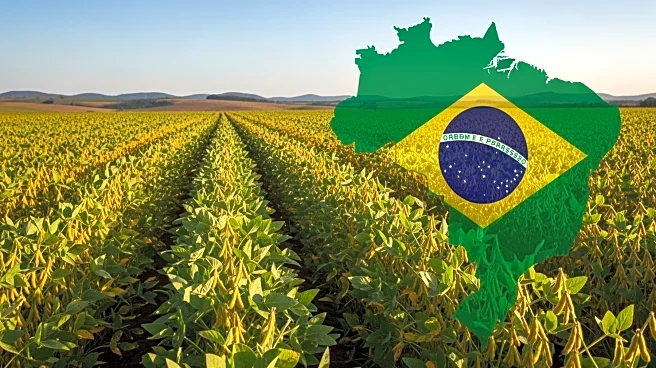What's Happening?
Brazilian farmers are projected to harvest a record 177.64 million metric tons of soybeans in the 2025/26 season, according to crop agency Conab. This forecast represents an increase of approximately 6 million tons compared to the previous year. The growth
is attributed to a 3.6% expansion in the area sown with soybeans, totaling 49 million hectares. Brazilian exports are expected to exceed 112 million tons, driven by a reduction in U.S. soy exports due to ongoing trade tensions with China. Parana state leads in planting progress, with 31% of the area sown, followed by Mato Grosso at 18.9%. Additionally, Brazil's second corn crop, planted post-soybean harvest, is predicted to reach 113.2 million tons.
Why It's Important?
The anticipated record soybean harvest underscores Brazil's growing role as a major player in global agriculture, particularly in the soybean market. The increase in exports could bolster Brazil's economy, especially as the U.S. faces challenges in its trade relations with China. This development may shift global trade dynamics, with Brazil potentially capturing a larger share of the Chinese market. The expansion of soybean cultivation also highlights Brazil's agricultural capacity and its strategic importance in meeting global food demands. However, this growth may raise environmental concerns, particularly regarding land use and deforestation.
What's Next?
Brazilian farmers are awaiting the return of rains, expected in late October, to continue planting. The progression of the U.S.-China trade war will likely influence Brazil's export strategies and market positioning. Stakeholders, including environmental groups, may increase scrutiny on agricultural practices and their impact on Brazil's ecosystems. The government and industry leaders might explore sustainable farming initiatives to balance economic growth with environmental preservation.
Beyond the Headlines
The expansion of soybean cultivation in Brazil could have long-term implications for land use and biodiversity. As Brazil increases its agricultural output, there may be pressure to address deforestation and habitat loss. The country's ability to manage these environmental challenges while maintaining economic growth will be crucial. Additionally, Brazil's agricultural success may inspire other nations to adopt similar strategies, potentially reshaping global agricultural practices.















